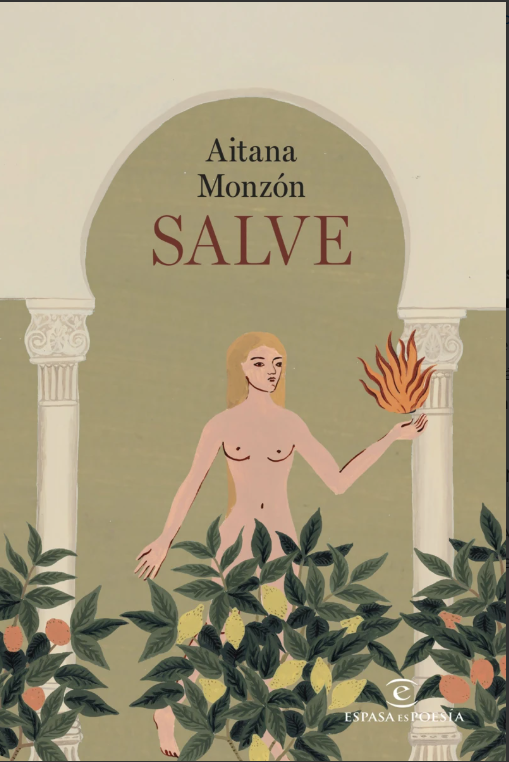
Monzón, Aitana. 2025. Salve. Madrid: Espasa. https://www.planetadelibros.com/libro-salve/411696
Salve unfolds before us like a liturgy, a dance between the mobile and the immobile, a thirst, ruins, and solitude. Between funeral rites and Adriatic suns, the poetic voice rises and announces that life is nothing more than a quiet, tender, passionate happening. Continuing with the cardinal points present in her previous collection of poems, La civilización no era esto (IV Premio de Poesía Espasa), Aitana Monzón’s poetry explores the relationality of a society in crisis, always searching for the light and hope of a new time.
Ossana, Eugenia. Nigerian Authors and the Me-Generation: New Shades of Black. London and New York: Routledge, 2024. 302 pp. ISBN: 9781032872957. DOI: 10.4324/9781003545316-1.
Nigerian Authors and the Me-Generation: New Shades of Black explores African literary issues and focuses on Nigerian generations throughout history. It also underscores women authors’ relatively unknown or dispersed role and their positions regarding Western feminism. Concurrently, the book acknowledges the emergence of a current Generation called the Me-Generation, dealing with erstwhile taboo themes and genre experimentation. Three contemporary novels are singled out and analysed: My Sister, the Serial Killer by Oyinkan Braithwaite, A Small Silence by Jumoke Verissimo and Freshwater by Akwaeke Emezi. They deal with the trope of blackness as humour and satire, as a healing space and as Igbo spiritual cosmovision, which contests Western givens. This book can become a reference for those interested in African literature and, particularly, Nigerian literature. Additionally, it can be a starting point to enrich the debate on African literature.
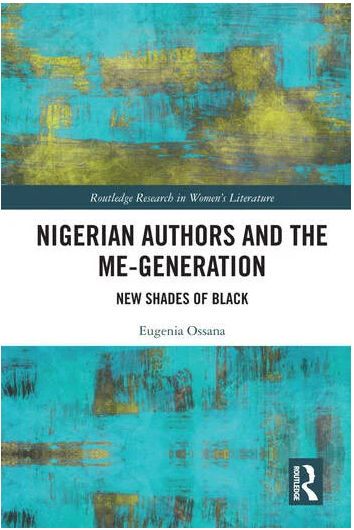

Pellicer-Ortín, Silvia; Julia Kuznetski and Chiara Battisti, eds. 2024. The Routledge Companion to Literatures and Crisis. London and New York: Routledge.
The Routledge Companion to Literatures and Crisis provides deep insight into a complex and multi-layered phenomenon. The third decade of the twenty-first century is being marked by a polycrisis caused by various world crises, such as the COVID-19 pandemic, armed conflicts and climate change leading to economic, geopolitical, environmental, health and security crises.
Featuring 42 chapters, the collection examines crises through literary texts in relation to the environment, finance, migration and diaspora, war, human rights, values and identity, health, politics, terrorism and technology. It illuminates the many faces of the current permacrisis as well as the multifarious crises of the past and their representation in literatures across ages and cultures—from the Viking wars, Black Death in mediaeval Europe, technology in ancient China and the crisis of power in Elizabethan England to imperial biopower in nineteenth-century India, the genocides in the twentieth century, upsurge of domestic violence during the Covid lockdown in Spain and the development of AI.
The Companion connects diverse cultures, disciplines and academic traditions to show how and why literature, media and art can voice all types of crises across times. It will be a key resource for students and researchers in a broad range of areas including literature, film studies, narrative studies, cultural studies, international politics and ecocriticism.
Pellicer-Ortín, Silvia and Julia Kuznetski, eds. 2023. “We Too”: Female Voices in the Transnational Era of Crises, Migration, Pandemic and Climate Change, Special Issue of Women: A Cultural Review, vol. 34, nos. 1-2.
This special issue aims to provide a deeper insight into cultural responses to various contemporary crises, such as migratory movements in recent history and, at the very present moment, pandemics, climate change and such other unsettling societal processes as political and economic ruptures, armed conflicts or environmental disasters. In particular, our aim is to draw attention to the way these changes have affected women’s lives and the way female writers and artists represent these processes and their consequences in diverse cultural narratives, such as fiction, poetry, experimental and autobiographical works. We explore issues related to diaspora, feminism, environmentalism, new materialism, memory and identity from a transnational and intersectional perspective, attempting to find connections among those cultural texts by women voicing some of the most relevant crises that have configured and are still re-configuring our global and local identities.


Pellicer-Ortín, Silvia; Julia Kuznetski and Chiara Battisti, eds. 2024. The Routledge Companion to Literatures and Crisis. London and New York: Routledge.
Literature has traditionally been concerned with the expression of grievability through such forms as elegy, testimony or (pseudo-)autobiography. Such genres provide means to perform mourning or, conversely, postulate an ethics of melancholia through continuing attachment to the departed. In our post-trauma age, this traditional function of literature has brought to the fore such aspects of grievability as the influence of race, class, gender and/or sexual orientation in the determination of the grievability or ungrievability of the human beings exposed to individual or collective violence. Thus, some fictions delve into the lives of those considered ungrievable and are submitted to invisibility and/or illicit dead, while in perpetrator trauma fictions it is the perpetrators themselves whose refusal or impossibility to acknowledge the harm done to others under warfare conditions fosters a relation of spectrality that transforms the unfairly killed into ghosts who cannot be laid down to rest. In the wake of Judith Butler’s work on (un-)grievable groups, this book addresses the ways in which fiction in English since the 1990s operates in its singularity to delve into the socio-cultural construction of grievability, thereby refining and displacing the more traditional categories of subalternity, inaudibility and invisibility associated with the poetics of postmodernism.
Pignagnoli, Virginia. 2023. Post-Postmodernist Fiction and the Rise of Digital Epitexts. Columbus: Ohio State University Press.
Post-Postmodernist Fiction and the Rise of Digital Epitexts explores new dynamics created by the intersection of digital media and contemporary fiction, arguing that these synergies are part of the cultural context in which the post-postmodernist novel emerges. Virginia Pignagnoli introduces a rhetorical theory of paratexts meant to reshape traditional views of paratextuality, providing categories, functions, and properties able to accommodate new digital practices, such as those of digital epitexts (authors’ social media posts and novels’ websites, for example), that widen the space for authorial creation and narrative exchange beyond the print novel. Focusing on the effects digital epitexts have on audiences, Pignagnoli presents an analysis of contemporary novels—by Michael Chabon, Jennifer Egan, Catherine Lacey, Meg Wolitzer, and Dave Eggers—that display a post-postmodern sensitivity in dialogue with some of the ways digital epitexts are currently employed. Ultimately, in showing how twenty-first-century novels and digital epitexts are co-constitutive, Pignagnoli offers a vision of a new post-postmodernism interested in sincerity, relationality, and intersubjectivity.
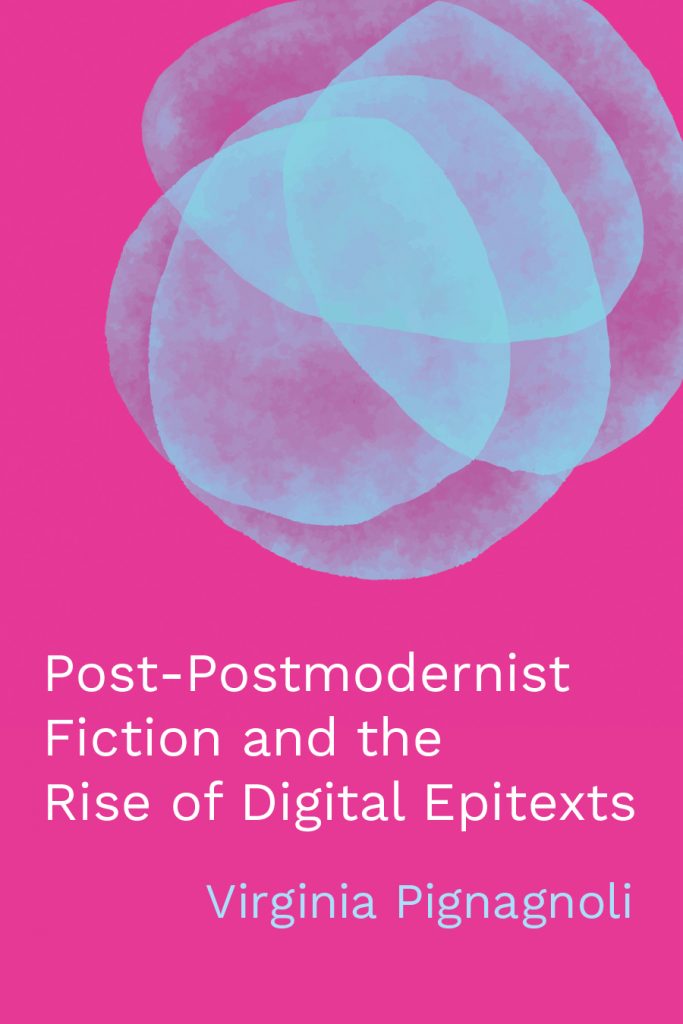
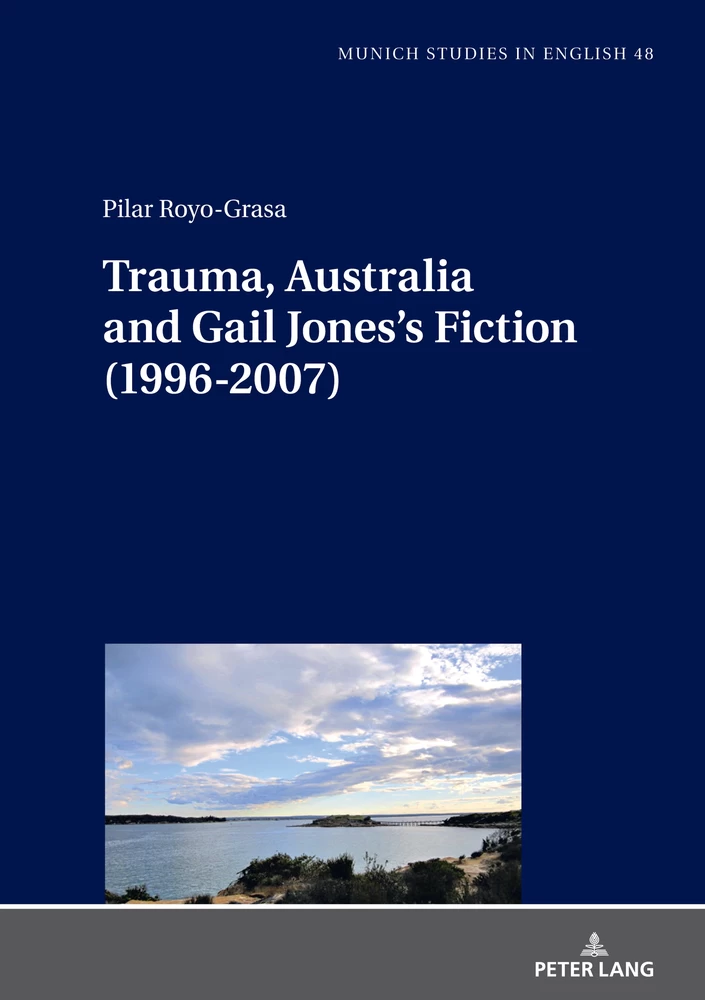
Royo-Grasa, Pilar. 2022. Trauma, Australia and Gail Jones’s Fiction (1996-2007). Berlin: Peter Lang.
Australia’s official Reconciliation project confronted Australians with the continuous violent dispossession suffered by the country’s Indigenous peoples and the pressing need to offer a public apology to them. While trauma became a tool to create paths of empathy and reconciliation between indigenous and non-indigenous Australians, it was also a manipulative strategy to deny the country’s shameful history. This book examines Gail Jones’s literary contribution to such debates. It examines Gail Jones’s questioning of Australia’s victimology narratives, and offers an insightful discussion of the transmedia, transnational and multidirectional approach to trauma in the reconciliation-related novels she published during John Howard’s vexed Liberal Government (1996-2007).
José M. Yebra. 2022. The Traumatic Celebration of Beauty in Alan Hollinghurst’s Fiction. Heidelberg: Universitätsverlag Winter.
The Traumatic Celebration of Beauty in Alan Hollinghurst’s Fiction’ is the first monograph to delve into all the novels published by the writer so far: from his extraordinary debut, The Swimming-Pool Library (1988), to The Sparsholt Affair (2017). The chapters follow a chronological order in Hollinghurst’s production. However, all of them address the complex interaction of traumatic and celebratory discourses as voiced by gay and queer characters ranging from the twentieth to the early twenty-first century. This timely volume is intended to explore the limits of same-sex desire and identity in Hollinghurst’s six novels drawing on trauma theory and intertextuality.
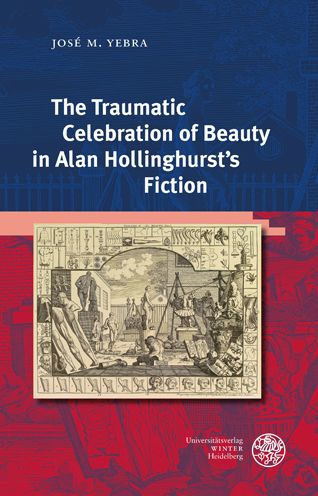
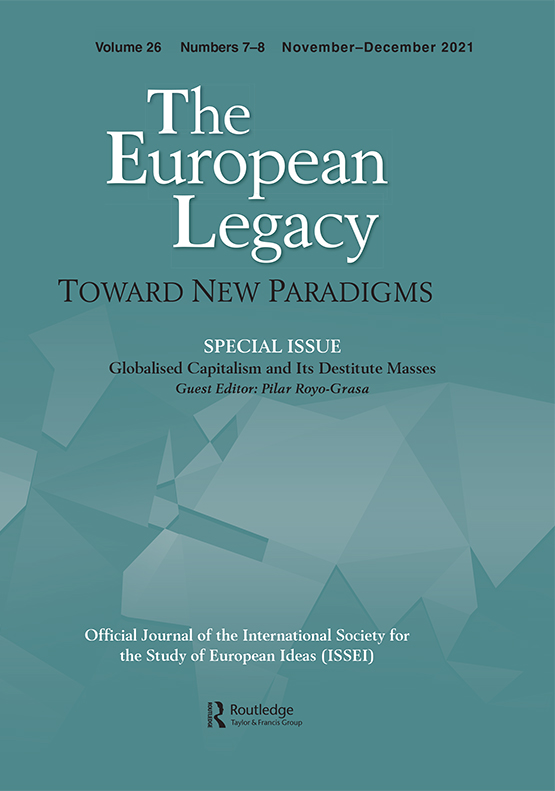
Royo-Grasa, Pilar, ed. 2021. Globalised Capitalism and Its Destitude Masses. Special Issue. The European Legacy: Toward New Paradigms vol. 26, nos.7-8.
Much has been written over the past two decades on globalization, especially on its political and socioeconomic impacts on Western liberal democracies on the one hand, and on the more vulnerable countries and communities around the world on the other. This Special Issue includes eight articles which explore the impact of globalized capitalism on destitute communities around the world and the literary strategies they used to cope with and denounce their precarity and stigmatization. The two articles that open the Special Issue focusing on two distinct social groups in post-Independence India—Indian tech-workers, and the Dalit community. The four articles that follow deal with literary representations of the destitute in the South Pacific, with a particular focus on Australian Indigenous peoples and asylum-seekers in search of refuge in Australia. The last two articles address the destituteness suffered by war victims.
Pellicer Ortín, Silvia; Silvia Martínez-Falquina, and Bárbara Arizti, eds. 2021. Beneath the Waves: Feminisms in the Transmodern Era. Special Issue. The European Legacy: Toward New Paradigms. vol. 26, nos. 3-4.
The aim of this Special Issue is to examine some typically transmodern concerns in a variety of contemporary literary and artistic works from several different yet related theoretical feminist perspectives. While the past few decades have been crucial for female empowerment, they have at the same time seen a backlash against feminist achievements. On the one hand, even a brief glance at the official statistics shows that women continue to be the main victims of domestic violence; that together with children they are disproportionately affected by armed conflicts; they lead the ranks of the poor and are especially vulnerable in times of economic recession, enforced migration, and the deleterious effects of climate change in various regions of the world. More recently, new restrictions have been imposed on women’s reproductive rights in several western countries, rape culture has spread alongside the pornography industry, and the “angry white men” has emerged as a movement which promotes a demonised image of feminism.

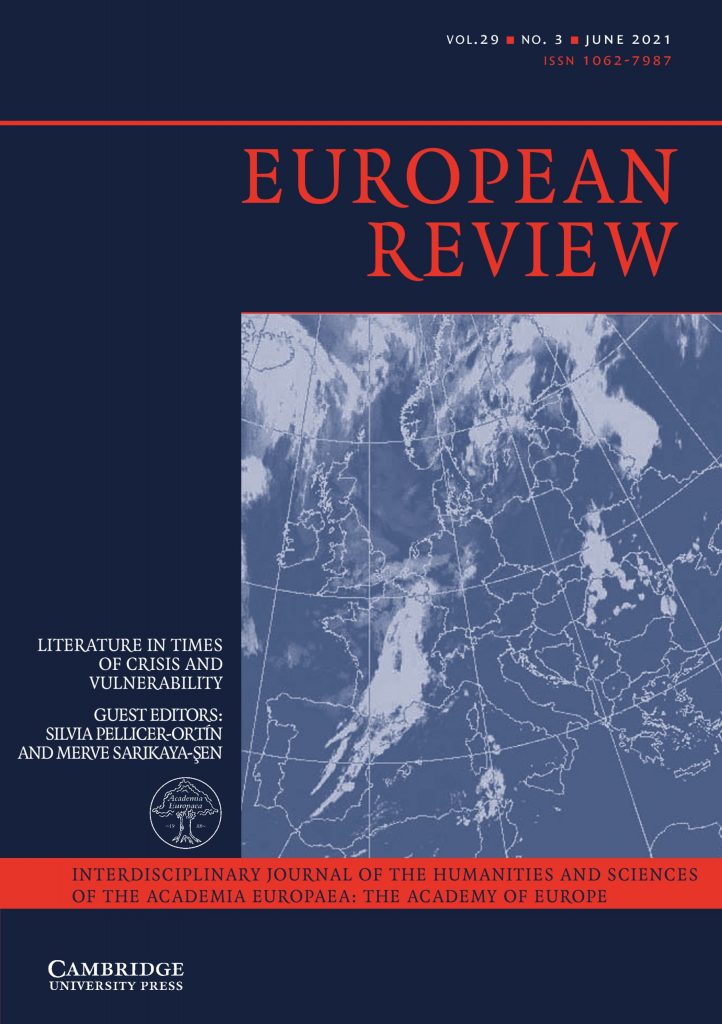
Pellicer-Ortín, Silvia and Merve Sarikaya-Şen, eds. 2021. Literature in Vulnerable Times: Responding to Crisis. Special Issue. European Review vol. 29, no.3 (June/July).
The late twentieth and early twenty-first centuries have been dominated by multifarious crises that have given way to individual and collective wounds resulting from environmental disasters, exile and migratory movements, war, terrorism, radicalism and other disturbing historical episodes. Our main contention is that trauma and/or excessive exposure to vulnerable situations can be relieved thanks to diverse narrative practices. Accordingly, we explore the field of Trauma Studies since its emergence to its current evolution towards the vulnerability paradigm, examining the different meanings of vulnerability not only from the perspective of the life sciences but also from the social sciences and its application to the humanities. Then, we move on to the notion of resilience and how it can help us articulate and/or move beyond trauma and vulnerability. In keeping with this, considering the ethical and political relationality between the self and other, we highlight one’s tendency to be affected by the other’s wounds and vulnerability as well as the inevitability of interdependency and interconnectedness between people and non-human entities. Thus, we explore the role of literature in giving voice to the voiceless and to unheard experiences of suffering as well as in representing the demise of the sovereign self and the rise of human and non-human interconnectedness after being exposed to traumatic or disastrous events, as represented in contemporary literatures in English.
Onega, Susana, and Jean-Michel Ganteau, eds. 2020. Transcending the Postmodern: The Singular Response of Literature to the Transmodern Paradigm. London and New York. Routledge.
Transcending the Postmodern: The Singular Response of Literature to the Transmodern Paradigm gathers an introduction and ten chapters concerned with the issue of Transmodernity as addressed by and presented in contemporary novels hailing from various parts of the English-speaking world. Building on the theories of Transmodernity propounded by Rosa María Rodríguez Magda, Enrique Dussel, Marc Luyckx Ghisi and Irena Ateljevic, inter alia, it investigates the links between Transmodernity and such categories as Postmodernity, Postcolonialism and Transculturalism with a view to help define a new current in contemporary literary production. The chapters either follow the main theoretical drives of the transmodern paradigm or problematise them. In so doing, they branch out towards various issues that have come to inspire contemporary novelists, among which: the presence of the past, the ascendance of new technologies, multiculturalism, terrorism, and also vulnerability, interdependence, solidarity and ecology in a globalised context. In so doing, it interrogates the ethics, aesthetics and politics of the contemporary novel in English.
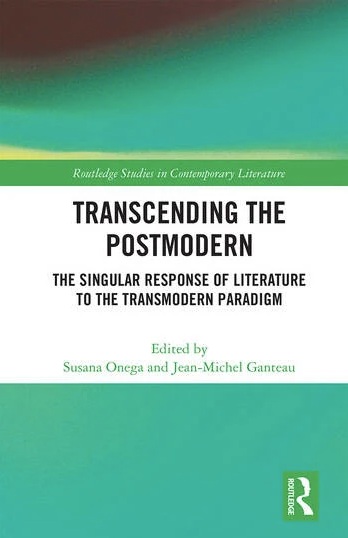
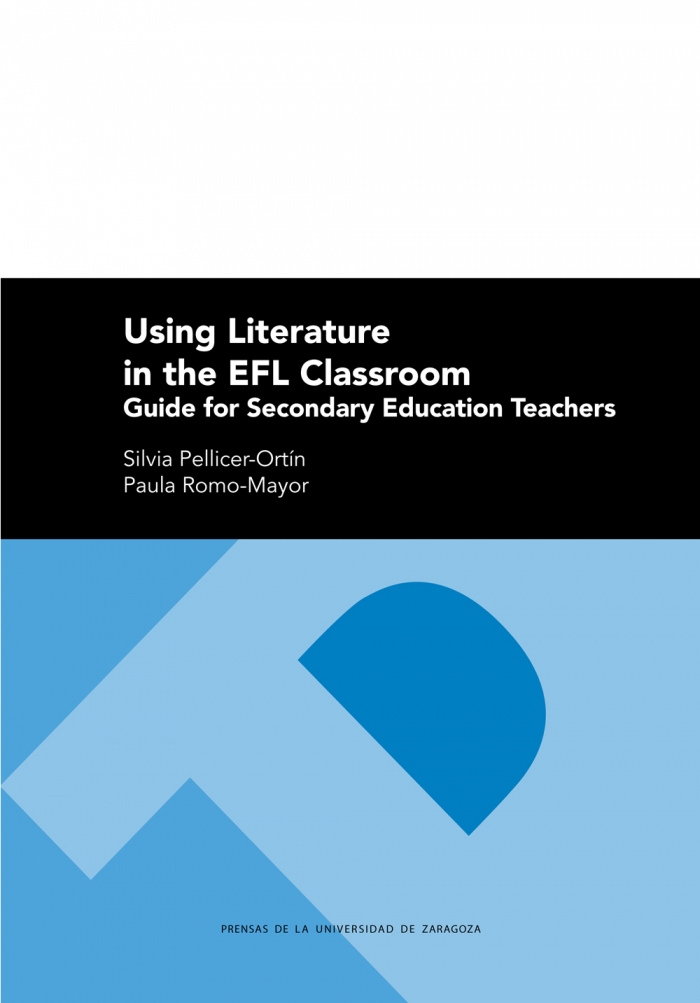
Pellicer-Ortín, Silvia and Paula Romo-Mayor, 2020. Using Literature in the EFL Classroom. Guide for Secondary Education Teachers. Zaragoza: Prensas Universitarias.
Using Literature in the EFL Classroom is a guide which aims to support and encourage teachers of English language in Secondary Education to introduce literary texts into the English classroom. It provides relevant theoretical information about the communicative approach and its connection with literature, as well as useful tools for selecting the literary genres and texts that best suit our teaching objectives. In addition, it contains proposals of authors and a wide variety of texts with examples of tasks that allow us to work on all the linguistic skills in each of the courses of Secondary and Baccalaureate.
Yebra, José M., 2020. The Poetics of Otherness and Transition in Naomi Alderman’s Fiction. Newcastle-Upon-Tyne: Cambridge Scholars Publishing.
Literature has traditionally been concerned with the expression of grievability through such forms as elegy, testimony or (pseudo-)autobiography. Such genres provide means to perform mourning or, conversely, postulate an ethics of melancholia through continuing attachment to the departed. In our post-trauma age, this traditional function of literature has brought to the fore such aspects of grievability as the influence of race, class, gender and/or sexual orientation in the determination of the grievability or ungrievability of the human beings exposed to individual or collective violence. Thus, some fictions delve into the lives of those considered ungrievable and are submitted to invisibility and/or illicit dead, while in perpetrator trauma fictions it is the perpetrators themselves whose refusal or impossibility to acknowledge the harm done to others under warfare conditions fosters a relation of spectrality that transforms the unfairly killed into ghosts who cannot be laid down to rest. In the wake of Judith Butler’s work on (un-)grievable groups, this book addresses the ways in which fiction in English since the 1990s operates in its singularity to delve into the socio-cultural construction of grievability, thereby refining and displacing the more traditional categories of subalternity, inaudibility and invisibility associated with the poetics of postmodernism.

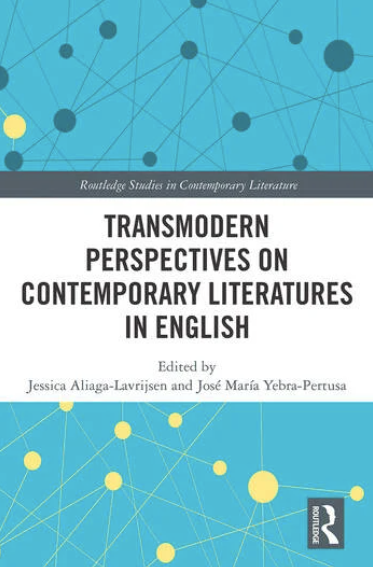
Aliaga-Lavrijsen, Jessica and José María Yebra-Pertusa, eds. 2019. Transmodern Perspectives on Contemporary Literatures in English. New York: Routledge.
Transmodern Perspectives on Contemporary Literatures in English offers a constructive dialogue on the concept of the transmodern, focusing on the works by very different contemporary authors from all over the world, such as: Chimanda Ngozi Adichie, Margaret Atwood, Sebastian Barry, A. S. Byatt, Tabish Khair, David Mitchell, Alice Munroe, Harry Parker, Caryl Phillips, Richard Rodriguez, Alan Spence, Tim Winton and Kenneth White. The volume offers a thorough questioning of the concept of the transmodern, as well as an informed insight into the future formal and thematic development of literatures in English.
Pellicer-Ortín, Silvia and Julia Kuznetski, eds. 2019. Women on the Move: Body, Memory and Femininity in Present-Day Transnational Diasporic Writing. London and New York: Routledge.
Women on the Move: Body, Memory and Femininity in Present-day Transnational Diasporic Writing explores the role of women in the current globalized era as active migrants. Silvia Pellicer-Ortín and Julia Kuznetski have brought together a collection of essays from scholars in diaspora, migration and gender studies to take a look at the female experience of migration and globalization by covering topics such as vulnerability, empowerment, trauma, identity, memory, violence and gender construction, which will continue to shape contemporary literature and the culture at large.
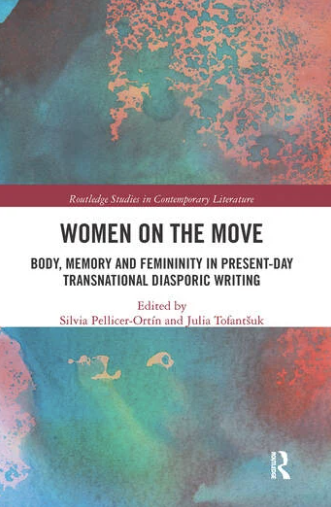

Escudero-Alías, Maite. 2019. Long Live the King: A Genealogy of Performative Genders. Second edition (first ed. 2009). Cambridge Scholars Publishing.
Masculinity is no longer a monolithic category, if ever it was. Long Live the King is a solid piece of scholarship that explores in depth the drag king phenomenon as well as key theoretical texts by feminist, postcolonial and cultural thinkers. Maite Escudero-Alías delves into drag king culture and highlights its relevance for the study of the relationship between gender, sex, race and sexuality. Introduced by a well-informed theoretical chapter that traces the roots of queer theory, Long Live the King provides the reader with a rigorous textual and cultural examination of drag kings’ most innovative performances of masculinity in the USA and the UK. These chapters prove groundbreaking in their acute analyses of drag kings’ acts in different media, ranging from still images to live performances, documentaries, mainstream television series and literature. Theory and analysis blend perfectly and Escudero-Alías’s main contention in this research – the ambivalent nature of drag kings’ performances of masculinity – is conducted convincingly. This book constitutes an invaluable contribution to the field of gender studies and a fair assessment of the political impact of minority artistic practices in contemporary culture.
Onega, Susana, and Jean-Michel Ganteau, eds. 2018. The Wounded Hero in Contemporary Fiction: A Paradoxical Quest. Routledge Studies in Contemporary Literature.
The Wounded Hero in Contemporary Fiction tracks the emergence of a new type of physically and/or spiritually wounded hero(ine) in contemporary fiction. Editors, Susana Onega and Jean-Michel Ganteau bring together some of the top minds in the field to explore the paradoxical lives of these heroes that have embraced, rather than overcome, their suffering, alienation and marginalisation as a form of self-definition.
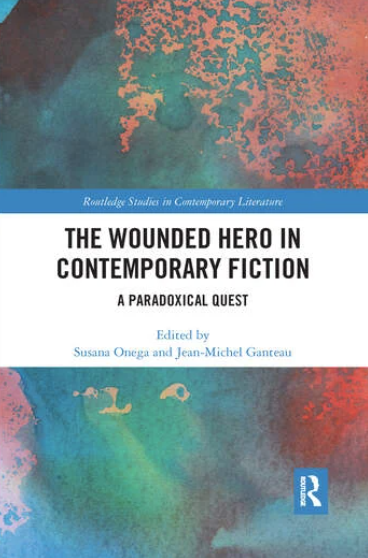
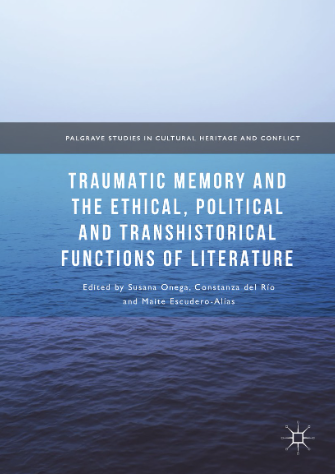
Onega, Susana, Constanza del Rio and Maite Escudero-Alías, eds. 2017. Traumatic Memory and the Ethical, Political and Transhistorical Functions of Literature. Houndmills, Basingstoke: Palgrave Macmillan.
This volume addresses the construction and artistic representation of traumatic memories in the contemporary Western world from a variety of interdisciplinary critical approaches. The chapters introduce complementary concepts from diverse thinkers including Cathy Caruth, Jacques Derrida, Judith Butler, Homi Bhabha, Abraham and Torok, and Joyce Carol Oates; they also draw from fields of study such as Memory Studies, Theory of Affects, Narrative and Genre Theory and Cultural Studies. Traumatic Memory and the Ethical, Political and Transhistorical Functions of Literature addresses trauma as a culturally embedded phenomenon and deconstructs the idea of trauma as universal, transhistorical, and abstract.
Ganteau, Jean-Michel, and Susana Onega, eds. 2017. Victimhood and Vulnerability in 21st-Century Fiction. London and New York: Routledge.
Editors Jean-Michel Ganteau and Susana Onega have assembled a volume which addresses the relationship between trauma and ethics, and moves one step further to engage with vulnerability studies in their relation to literature and literary form. It consists of an introduction and of twelve articles written by specialists from various European countries and includes an interview with US novelist Jayne Anne Philips, conducted by her translator into French, Marc Amfreville, addressing her latest novel, Quiet Dell, through the victimhood-vulnerability prism. The corpus of primary sources on which the volume is based draws on various literary backgrounds in English, from Britain to India, through the USA. The editors draw on material from the ethics of alterity, trauma studies and the ethics of vulnerability in line with the work of moral philosophers like Emmanuel Levinas, as well as with a more recent and challenging tradition of continental thinkers, virtually unknown so far in the English-speaking world, represented by Guillaume Le Blanc, Nathalie Maillard, and Corinne Pelluchon, among others. Yet another related line of thought followed in the volume is that represented by feminist critics like Catriona McKenzie, Wendy Rogers and Susan Dodds.
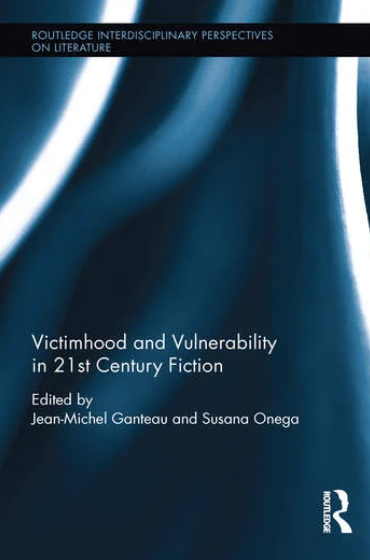
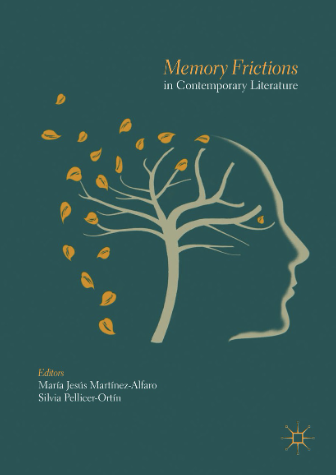
Martínez-Alfaro, María Jesús and Silvia Pellicer-Ortín, eds. 2017. Memory Frictions in Contemporary Literature. Basingstoke, London: Palgrave Macmillan.
This volume explores the multifarious representational strategies used by contemporary writers to textualise memory and its friction areas through literary practices. By focusing on contemporary narratives in English from 1990 to the present, the essays in the collection delve into both the treatment of memory in literature and the view of literature as a medium of memory, paying special attention to major controversies attending the representation and (re)construction of individual, cultural and collective memories in the literary narratives published during the last few decades. By analysing texts written by authors of such diverse origins as Great Britain, South-Korea, the USA, Cuba, Australia, India, as well as Native-American Indian and African-American writers, the contributors to the collection analyse a good range of memory frictions —in connection with melancholic mourning, immigration, diaspora, genocide, perpetrator guilt, dialogic witnessing, memorialisation practices, inherited traumatic memories, sexual abuse, prostitution, etc.— through the recourse to various disciplines —such as psychoanalysis, ethics, (bio)politics, space theories, postcolonial studies, narratology, gender studies—, resulting in a book that is expected to make a ground-breaking contribution to a field whose possibilities have yet to be fully explored.
Pellicer-Ortín, Silvia. 2015. Eva Figes’ Writings: A Journey through Trauma. Newcastle-upon-Tyne: Cambridge Scholars Publishing.
This book provides a general overview of the life and literary career of the prolific writer Eva Figes, placing her extensive production within the various literary movements that have shaped the last century, and drawing on the main features of her works and the different stages in her production. Having recourse to the tools provided by narratology and using the theoretical background of the disciplines of ethics, Holocaust and trauma studies, together with other related fields such as theories of artistic representation, identity questions concerning Jewishness, contemporary history and philosophy, it carries out a comprehensive analysis of Figes’s main works.The main starting hypothesis explored throughout the book is that an evolution may be traced in the aesthetics employed by Figes throughout her career – from her initial Modernist phase to her more realist position – to depict individual and collective traumas. This development is a result of her need to find a mode of representing various traumatic events that have given shape to her personal and family history and to our recent collective history, from the two World Wars and the Holocaust to the social exclusion suffered by minority groups like women or the Jewish immigrant communities. This evolution will be also approached thematically, as there is a development from her early interest in depicting isolated male traumatised characters to the traumas suffered by women under patriarchal structures, and, then, to the encounter with her own suffering as a Holocaust survivor. The author’s evolution in the topics and narrative techniques employed mirrors the different stages in the individual and collective processes of recovery from traumatic experiences, from the process of acting out to the eventual healing phase. Thus, the conclusions detailed here will be useful not only to make Figes’ work known to a wider audience, but also to gain an insight into the evolution of the literary tendencies of the last few decades in trying to represent some of the most horrible events of the modern age.
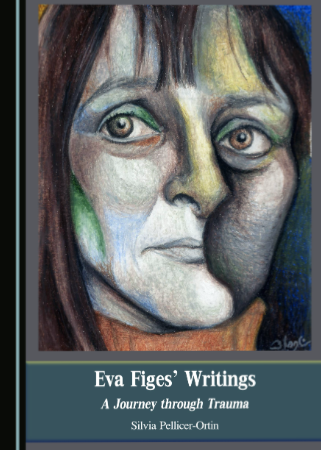
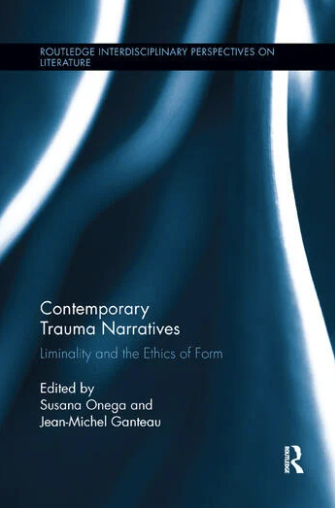
Onega, Susana, and Jean-Michel Ganteau, eds. 2014. Contemporary Trauma Narratives: Liminality and the Ethics of Form. London and New York: Routledge.
This book provides a comprehensive compilation of essays on the relationship between formal experimentation and ethics in a number of generically hybrid or “liminal” narratives dealing with individual and collective traumas, running the spectrum from the testimonial novel and the fictional autobiography to the fake memoir, written by a variety of famous, more neglected contemporary British, Irish, US, Canadian, and German writers. Building on the psychological insights and theorizing of the fathers of trauma studies (Janet, Freud, Ferenczi) and of contemporary trauma critics and theorists, the articles examine the narrative strategies, structural experimentations and hybridizations of forms, paying special attention to the way in which the texts fight the unrepresentability of trauma by performing rather than representing it. The ethicality or unethicality involved in this endeavor is assessed from the combined perspectives of the non-foundational, non-cognitive, discursive ethics of alterity inspired by Emmanuel Levinas, and the ethics of vulnerability. This approach makes Contemporary Trauma Narratives an excellent resource for scholars of contemporary literature, trauma studies and literary theory.
Ganteau, Jean-Michel, and Susana Onega, eds. 2013. Trauma and Romance in Contemporary British Literature. Routledge: London and New York.
Drawing on a variety of theoretical approaches including trauma theory, psychoanalysis, genre theory, narrative theory, theories of temporality, cultural theory, and ethics, this book breaks new ground in bringing together trauma and romance, two categories whose collaboration has never been addressed in such a systematic and in-depth way. The volume shows how romance strategies have become an essential component of trauma fiction in general and traumatic realism in particular. It brings to the fore the deconstructive powers of the darker type of romance and its adequacy to perform traumatic acting out and fragmentation. It also zooms in on the variations on the ghost story as medium for the evocation of trans-generational trauma, as well as on the therapeutic drive of romance that favors a narrative presentation of the working-through phase of trauma. Chapters explore various acceptations and extensions of psychic trauma, from the individual to the cultural, analyzing narrative texts that belong in various genres from the ghost story to the misery memoir to the graphic novel. The selection of primary sources allows for a review of leading contemporary British authors such as Peter Ackroyd, Martin Amis, Ian McEwan, Salman Rushdie, Graham Swift, Sarah Waters and Jeanette Winterson, and of those less canonical such as Jackie Kay, Alan Moore and Dave Gibbons, Justine Picardie, Peter Roche and Adam Thorpe.

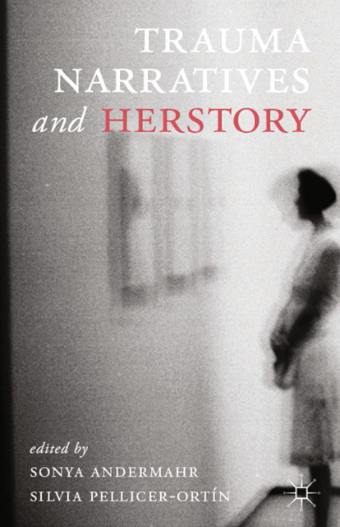
Andermahr, Sonya and Silvia Pellicer-Ortín, eds. 2013. Trauma Narratives and Herstory. Basingstoke, London: Palgrave Macmillan.
This book draws together international scholars to examine the representation of female trauma and women’s version of history in contemporary literature and culture. Focusing on texts by or about women, the book explores the variety of representational strategies used to depict female traumatic experiences, and articulates the complex relation between trauma, gender and signification. Taking an interdisciplinary approach to trauma, the authors analyse a range of genres including fictional texts, autobiography, comics and film. Writers discussed include: Alice Walker, Eva Figes, Cristina García, Toni Morrison, Alice Munro, Dorothy Allison, Diane Noomin and Maxine Hong Kingston, among others. Demonstrating a rich plurality of perspectives, the volume sheds light on the power of literature and art to enable minority subjects to come to terms with loss and trauma.
Aliaga-Lavrijsen, Jessica and Michael Bicks, eds. 2013. Is this a Culture of Trauma? An Interdisciplinary Perspective. Leiden: Brill.
The 20th century has been characterised by an unprecedented violence that seems to have left an imprint in contemporary societies: from the two World Wars or the terrorist attack of 9/11 to natural catastrophes or sexual abuse. All of these terrible experiences have been collected, represented, and communicated by many different people, especially in the last few decades, as seen in the high number of books and lms dealing with traumatic experiences. As a result, an interdisciplinary ‘trauma studies’ field has emerged. At the 2nd Global Conference ‘Trauma: Theory and Practice’, an interdisciplinary conference hosted in Prague in the spring of 2012, academics and professionals met to explore and debate issues surrounding the experience of individual and collective traumas, their representations in art, and some theoretical approaches to trauma. This book is a collection of the papers presented at the conference, a snapshot of the current work in the field of trauma studies.
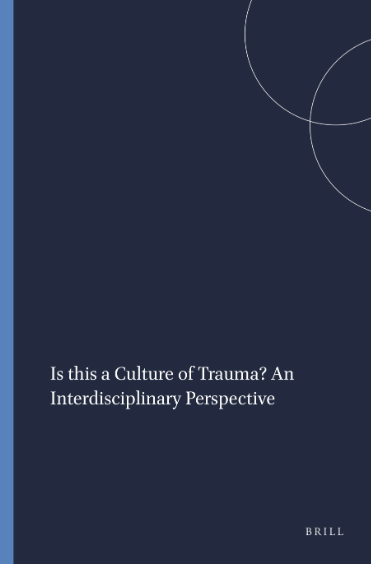

Aliaga-Lavrijsen, Jessica. 2013. The Fiction of Brian McCabe and (Scottish) Identity. New York: Peter Lang.
This study is the first monograph on the Scottish writer Brian McCabe. It focuses mainly on McCabe’s fiction and on the elements in his writing that allow for a redefinition of individual and national identity. The book opens with an examination of the socio-cultural context that shapes McCabe’s position in contemporary Scottish literature. The author goes on to consider McCabe as a writer of the Second Renaissance and the generation of the Lost Poets, and also focuses on the Scottish preoccupation with identity and its representations in the contemporary Scottish short story. Finally, she provides a chronological and thematic analysis of McCabe’s short story collections The Lipstick Circus, In a Dark Room with a Stranger and A Date with my Wife, and his novel The Other McCoy.
Onega, Susana, and Jean-Michel Ganteau, eds. 2011. Ethics and Trauma in Contemporary British Fiction. Leiden: Brill.
This volume is the first book of criticism to provide a systematic analysis of a corpus of emblematic contemporary British fictions from the combined perspective of trauma theory and ethics. Although the fictional work of writers such as Graham Swift has already been approached from this perspective, none of the individual works or authors under analysis in the twelve essays collected in this volume has been given such a systematic and in-depth scrutiny to date. This study, which is addressed to academics and university students of British literature and culture, focuses on the literary representation of trauma in key works by Martin Amis, J. G. Ballard, Pat Barker, John Boyne, Angela Carter, Eva Figes, Alan Hollinghurst, Delia Jarrett-Macauley, A.L. Kennedy, Ian McEwan, Michael Moorcock, Fay Weldon and Jeanette Winterson, within the context of the “ethical turn” in the related fields of literary theory and moral philosophy that has influenced literary criticism over the last three decades, with a special focus on the ethics of alterity, the ethics of truths, and deconstructive ethics.
